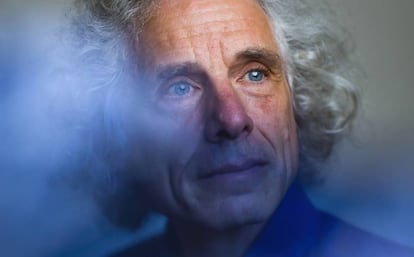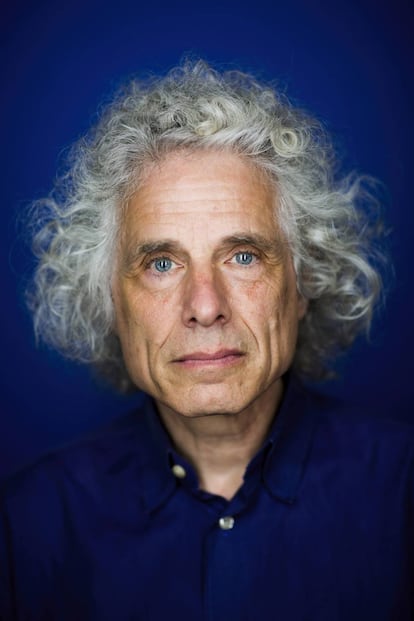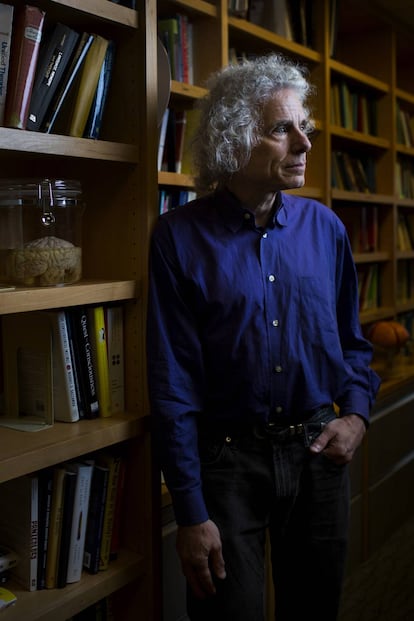Steven Pinker: “Populists are on the dark side of history”
Steven Pinker is one of the great figures of cognitive psychology and a specialist in the connections between mind and language. A tireless debater, popular science author and Harvard professor, his latest book: 'Enlightenment Now: The Case For Reason, Science, Humanism and Progress' takes issue with those whose apocalyptic vision for the world has cast them in the role of its savior – namely, the populists and the enemies of progress who appear to be gaining ground in the current global climate.

It was some time ago that Steven Pinker, 63, dispensed with God. As a teenager growing up in Montreal, Canada, he realized he didn’t need Him at all. “When I began to think about the world, I couldn’t find a place for Him and I realized that He wasn’t even useful as a theory,” he explains.
It was then that Pinker started a love affair with science, one that is still going strong 50 years later. Considered one of the most brilliant cognitive psychologists in the world, his academic work focuses on psycholinguistics and his books, such as The Blank Slate and The Better Angels Of Our Nature, challenge conventional thought on behavior and the decline of violence. His work has been hailed as the philosophy of the future.
It is not a definition that Pinker particularly enjoys, but it is difficult to avoid when one reviews his work. Each one of his books has had far-reaching effects and inspired a global debate in which, as an advocate of the genetic basis for human conduct, he has gained fame as an invincible opponent. His latest book, Enlightenment Now: The Case For Reason, Science, Humanism and Progress, which has been described by Bill Gates as “his favorite book ever”, takes on the enemies of progress –those who think that the world is going backwards and only they can save it. They come in the form of Donald Trump and his supporters, the Brexiteers, the populists and the tribal nationalists, all of whom reject the values of the Enlightenment.
Now more than ever, the principles of reason, science and humanism need to be defended because the ground we’ve gained could be lost, Pinker explains. “Progress is not a subjective matter. This is easy to understand: most people would rather live than die; they prefer abundance over poverty; health over sickness and safety over danger; knowledge over ignorance and freedom over tyranny... all this can all be measured and its evolution over time is what we call progress. That is what has to be defended.”

Pinker is seated in his office at Harvard. The brightly lit ninth floor of William James Hall, designed in 1963 by Minoru Yamasaki, overlooks Cambridge, Massachusetts, but the view is obscured by rain. In the cognitive psychology department, several students hang around Pinker’s office, browsing quietly through the rows of books, surrounded by models of the brain and the odd computer. Pinker sits on one of the violet-colored chairs, looking like a 1970s rocker, but he has about him an aura of calm and it is this serenity that best reflects the force of his convictions.
Enlightenment is, by definition, linked to capitalism. But hasn’t capitalism hit something of a rocky patch?
Enlightenment and capitalism are linked but there is much confusion. Many intellectuals interpret ‘the market’ as a free market and associate it with anarcho-capitalism or extreme liberalism. And they’re not the same thing. [Scottish philosopher] Adam Smith himself was very clear about this.
But during the recent crisis, a significant segment of the population, particularly the young, reached the conclusion that capitalism and the institutions that uphold the system have failed. And they have stopped trusting it. Instead, they feel like the victims of globalization. What would you say to them?
I would first urge them to look at the facts. Neither globalization nor the markets have made them poor. The reality is quite different. Extreme poverty has dropped by 75 percent in 30 years. Secondly, I would say that regulations and markets are not mutually exclusive. On the contrary, the crisis showed us that we have to avoid the chaos of unregulated markets. Thirdly, we need to remember the power the markets have to improve lives. The most significant decline in poverty in the history of humanity has probably taken place in China and that didn’t happen through massive redistribution of the Western world’s wealth, but through the development of market institutions.
I like to describe myself as a serious ‘possibilist’
That means economic improvement, not more freedom.
Economic freedom usually goes hand in hand with other forms of freedom. Looking beyond its market economy, South Korea, for example, is a much freer and more pleasant place than its neighbor to the north. When countries, such as Venezuela, abandon the market, they slide into misery. That’s what happened in the Soviet Union, Mao’s China and East Germany before the Wall came down.
Okay, so the world is a better place, thanks in part to the markets. But how do you explain the rise in populism?
Nobody knows for sure. Certainly the Great Recession was a contributing factor. But in Europe there was another factor at work. The strong migration flow from Muslim countries coincided with a rise in jihadist terrorism and the risks of that were exaggerated. Consequently, many people were gripped by fear and prejudice and this generated a reaction, which is nothing new. Populists are on the dark side of history. They feel uneasy and marginalized in the face of the gradual and unstoppable trend towards cosmopolitanism, the liberalization of convention, and rights for women, gays and minorities. All of that terrifies older white males who form the nucleus [of populism], who support Trump and Brexit and xenophobic political parties in Europe.

What is the ideology behind populism?
Populists share a tribe mentality, the same kind that also leads to nationalism and authoritarianism. They feel hostility towards institutions, they seek out a natural leader who will express the purity and truth of the tribe. They find the democratic, enlightened concept of a government as a temporary custodian of power bound by duties and limitations hard to accept.
So they reject the control of democratic institutions?
That’s right. The emphasis that the Enlightenment placed on institutions derives from the idea that, left to their own devices, humans will end up doing things badly, engaging in mutual aggression and the struggle for power. Consequently, there is no point in trying to change human nature, as totalitarian systems have always endeavored to, but rather to use human nature to keep human nature in check. As James Madison [US President between 1809 and 1817] said, ambition counters ambition. Which is where the system of checks and balances comes in. Obviously leaders try to have as much power as they can get, but if the courts and legislators, themselves no angels, stand up to them, the situation is neutralized and dictatorship avoided.
Do you see them gaining ground?
I don’t know if populism will defeat the forces of the Enlightenment but there are reasons to think not. However hard Trump tries, progress is very difficult to reverse. Populism has a strong rural base and it spreads through the less educated layers of society. But the world is increasingly more urban and educated. The Trump generation will, in fact, disappear and the millennials will take power and they are not keen on populism.
There is an extended tendency among intellectuals and journalists to highlight only the negative
But meanwhile, isn’t the world in danger from Trump?
Well, yes. His personality is impulsive, vindictive and punitive. And he has the power to declare nuclear war. Those are reasons enough. But on top of that, he opposes the institutions that have allowed progress to take place. He rejects global trade, international cooperation and the UN. The fact that we haven’t had another world war for decades is due to a series of mutual compromises that are based on the premise that we are a community of nations and we take decisions accordingly. Trump threatens all that. He has abandoned Obama’s vision of a world free from atomic weapons. He has rejected a deal with Iran and modernized his nuclear arsenal. His authoritarian instincts are posing a historic challenge both to the world and also to American democracy.
And what is your diagnosis?
I believe the institutions will win. There are many forces working against Trump and preventing him from turning his utterances into reality. And charismatic leaders have emerged who align themselves with the values of the Enlightenment such as Justin Trudeau and Emmanuel Macron.
But they don’t appear to carry enough weight.
In order to defeat populism, you have to also recognize the value of progress. There is an extended tendency among intellectuals and journalists to highlight only the negative and to describe the world as though it were constantly on the brink of catastrophe. It’s the default mentality. Trump exploited this way of thinking and didn’t encounter enough resistance from the left, because some agreed with him. But the fact is that many institutions, although not perfect, solve problems. They can avoid wars and reduce extreme poverty.
You are an optimist.
I like to describe myself as a serious ‘possibilist’.
After two world wars, the atomic bomb, the proliferation of weapons and terrorism, many people don’t believe the world to be a better place. Are they completely wrong? Is a certain pessimism not a way of avoiding becoming complacent?
You have to be realistic. Things can always get worse and it is true that complacency prevents us from seeing danger. Fatalism is risky, as in, ‘Why should we bother improving the world, if the world is only going to get worse?’ Fatalists are the people who think: if it’s not climate change, it will be robots that finish us off. The other risk is radicalism. Many young people see very real problems within the system. And that is good, but if you end up thinking that the institutions are so dysfunctional there’s no point in improving them, then you pave the way for radical solutions – ‘Everything can be torn down if nothing is worthwhile; better to build on the ashes.’ That is a terrible mistake because things will get much worse.
Is nationalism one of the destructive factors?
I grew up in Quebec and the tensions in Spain are not unfamiliar to me. Nationalism always runs the risk of becoming malevolent, but it can also be benevolent if it works as a social contract and is based on residence and not on religious belief, clans and tribes. The human mind has, in fact, a flexible interpretation of tribe. Tribe can refer to race but also to a sports team, or Windows versus Mac, Nikon versus Canon. And it can also unfold on multiple levels. You can be proud to be from Harvard, Boston, Massachusetts and also the world. If our sense of nationality exists alongside our sense of being European and, more importantly, being humans and citizens of the world, it can be benign. Nationalism is dangerous when it comes from a tribal imposition and is understood as a zero-sum game – as in our nation can only prosper if others do not.
Do social networks exacerbate populism?
Populists have used them. But I don’t want to blame social networks for everything. That has become fashionable: there’s a problem and they are to blame. Social media can be used positively – as Obama did.
Your book is uplifting, but when you listen to the news, it’s hard not to feel pessimistic. Is the prblem with the media?
Journalism has an inherent problem: it focuses on specific events rather than trends. And it is easier to deal with catastrophe than with something positive. This ends up creating a distorted view of the world. As the economist Max Roser said, yesterday the newspapers could have run the story that 137,000 people escaped from poverty. This is something that has been happening every day for the last 25 years, but it has never earned a headline. The result is that a billion people have escaped from extreme poverty and nobody knows it.
So the Enlightenment is backed by progress. But isn’t it irrational to be so optimistic? At the end of the day, the belief that things will get better is no more rational than the belief that everything will get worse.
Unconditional optimism is irrational. There is an unfounded belief that took shape in the 19th century that evolution equals progress. But evolution, in a technical and biological sense, works against human happiness. The biosphere is filled with disease agents in a constant state of evolution, working to make us sick. The organisms that we depend on for food don’t want to be our food. Life is a struggle. And the natural course of events is terrible. But humans disregard these problems. There’s a common fallacy that conceptualizes progress as a mystical force in the universe driving humans towards improvement. Always improvement. And it simply isn’t like that. We have a reasonable hope of progress if human institutions get the best from us, if they allow us to acquire new knowledge and solve problems. But that doesn’t always happen. There are a lot of forces that naturally make things worse.
Pinker winds up the interview with a slight smile. He gets up and heads for the photo session. After posing in front of a sinuous cinnamon-colored mass sunk in a formaldehyde solution, he says, “That brain is real.” His students glance up at him then continue to browse in silence. Outside, it is still raining in Cambridge.
English version by Heather Galloway.
